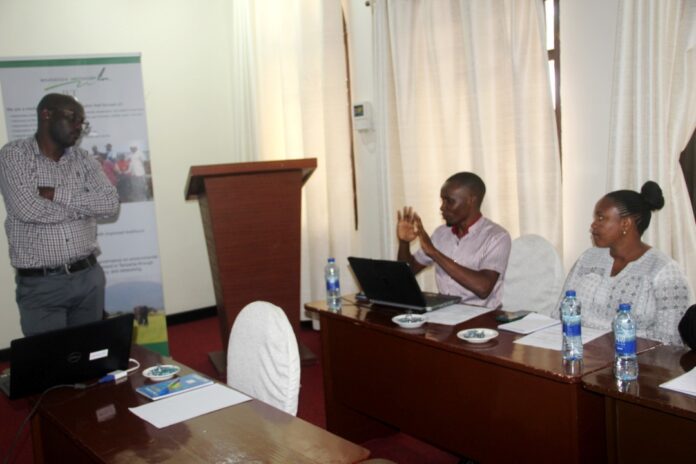By Lucy Samson
When he was starting his journalism studies 10 years ago, he had a big dream of becoming one of the most famous and successful journalists in Tanzania.
By that time, Faraja Masinde, a fast-growing data journalist in Tanzania, was most inspired by great journalists who were writing analytical stories in the famous newspapers in the country.
“When I read articles from famous writers in the country I reminded myself that one day my name and my stories will be read too,” he said.
Even after completing his studies and being employed in one of the newspapers in Tanzania he still didn’t know how he could achieve his dreams of becoming a famous and most successful journalist.
In the fourth year of his career, Mr Masinde saw an opportunity online about data journalism training by Nukta Africa. He could not ask himself twice to enroll.
An opportunity that changed everything
Masinde was among the first 20 journalists and editors to receive data journalism training from Nukta Africa in partnership with Internews Tanzania in 2019. The training, he said, improved and shaped his career in a direction he never imagined.
During the five days of training they learned the general concepts of data Journalism, sources of data, data analysis or interviewing data for stories and data visualization.
Masinde said he was motivated by being the only person in his workplace who was able to use data to generate stories.
“After seeing I was the only one with data journalism knowledge, I said I will still pursue it even if it is perceived as hard,” added Masinde.
According to the State of Data Journalism Survey 2022 conducted by the European Journalism Centre, most journalists’ obstacles to practicing data journalism is limited time to practice or deepening their knowledge in data journalism.

It was not so easy
Masinde cannot forget how he struggled to balance learning and working at the same time which put him in huge conflict with his editor and coworkers for taking a lot of time to produce a story.
“My co-worker used to mock me a lot. My editor said I was wasting time creating visuals and doing data analysis for a story which might be done in 30 minutes without such things.
Some days he would say none of our newspaper readers understood my visuals and data analysis I was doing…but I did not give up. I kept practicing until I became good at it,” he said.
From a trainee to an award winner and data-driven website owner
Around 2020, a year after training, Masinde was slowly moving towards achieving his dream.
He is now an award-winning data journalist owning a website dubbed ‘Gazetini’ which is a Swahili media focusing on data-driven stories through texts, images and visualization.
“I registered Gazetini late in 2022 and this is my second website. The first one I registered for in 2021 but unfortunately I couldn’t keep it due to some financial challenges,” Masinde said.
His faith in data journalism has transformed him into a mentor to his fellow workers, and a media owner with four employees.
“Data Journalism has made me a respected journalist. I am now closing deals with national and international organizations. Despite minor challenges, I am glad that I have reached here,” he said.
While Masinde celebrates his success, his trainers and mentors said his learning ambitions were beyond other journalists they have trained in the five years.
He was different from the beginning
“Masinde was different from all the other journalists we trained for years. Although he did not receive story reporting stipends, we usually provide for journalists to produce data stories, he put in his own efforts and now he is successful,” Mwingira said.
In five years since the opening of the media training service Nukta Africa has taught more than 1,000 media practitioners in Data journalism, multimedia journalism, fact-checking, podcast production, renewable energy reporting and biodiversity conservation reporting which are the most needed courses in the world.
Mwingira is pleased to see how data journalism has grown in such a short time.
“When we started training data journalism to journalists and other media practitioners it was not well known, until three years ago when we started seeing the results. At least there were more people interested to learn,’’ he said.
As of now Nukta Africa has produced competent data journalists who won various journalism awards such as Excellence in Journalism Awards of Tanzania (EJAT) from the Media Council of Tanzania (MCT) and National Bureau of Statistics (NBS) awards and others.
Media stakeholders in Tanzania agree that data journalism is one among the important skills journalists should have especially in the science and technology era.

Data journalism cannot be avoided
“Development of science and technology and the need to add new information processing knowledge has contributed to the development of data journalism in many areas of the world,” Alakok Mayombo, a
Senior Journalism Trainer at Internews Tanzania, said.
Internews have partnered with Nukta Africa for five years in training and mentoring journalists, editors and immediate journalism graduates on data journalism, fact-checking and podcast production.
Alakok said it is very crucial for all journalists, especially veteran journalists to learn emerging practices including data journalism that are in great demand for journalists so that they can remain relevant in the market.
“If you say you don’t want data journalism and other digital issues, you will be behind the times. It is good for people to learn and understand data storytelling because it is an unavoidable practice,” she said.
She was not surprised by the success of Masinde at all. Masinde, she said, had a personal learning effort that he will even stay up late in their lab which was once located in Kinondoni in the commercial capital, Dar Es Salaam to learn.
“I used to see him more often at our lab learning, he would often come to my office to ask for support when he needed it, I knew he would reach far more where he is now,” Alakok added.
More data journalism skills, more impact
Despite being an award winner, mentor and online media owner, Masinde said he wants more recognition and make an impact on young journalists in Tanzania.
“Everyone needs more success, so do I, but my other biggest dream is making an impact on Tanzania’s young journalists by sharing this crucial knowledge of data journalism,” Masinde said.
Lucy Samson is a Multimedia journalist at Nukta Africa specializing in health, environment and education reporting. You can reach her via lsamson@nukta.co.tz or @ Lucy Samson14 on Twitter.


